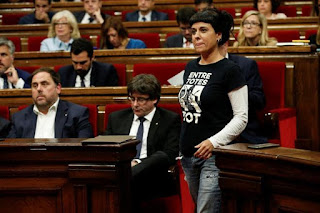 So the big DUI was kind of a dud. Perhaps never in history has a declaration of independence for a new nation been proclaimed with less enthusiasm. Was it even a declaration? In fact, no. President Puigdemont said that he "accepted the people's desire that Catalonia become an independent country in the form of a republic." So, he accepted that desire, but he didn't actually declare its existence. Then it gets really strange, even "Rajoyian": he immediately goes on to propose that Parliament suspend for a few weeks a declaration that he hasn't actually made so that there can be time for dialogue with the Madrid government. That's quite a feat! Chaos theory! Ever stranger: what about that proposal? A vote? No. An institutional declaration from Parliament regarding that? No. Nothing. What we did get, after the speeches were done and out of the glare of the tv cameras, was a true declaration of independence in written form, made in the name of the "Representatives of Catalonia", but signed, of course, only by members of the governing coalition. It's a strange document and unlikely to be treated kindly by history. After a somewhat lengthy introduction, the document proclaims the creation of an independent and sovereign Catalan Republic. It will be a Republic of laws, democratic, and "social". Not sure what "social" means. The process of creating the new republic will be citizen based and "transversal". Again, not sure exactly what they mean by "transversal". Well, I get the idea, but not sure how adjectives like "social" and "transversal" contribute anything meaningful to the text.
So the big DUI was kind of a dud. Perhaps never in history has a declaration of independence for a new nation been proclaimed with less enthusiasm. Was it even a declaration? In fact, no. President Puigdemont said that he "accepted the people's desire that Catalonia become an independent country in the form of a republic." So, he accepted that desire, but he didn't actually declare its existence. Then it gets really strange, even "Rajoyian": he immediately goes on to propose that Parliament suspend for a few weeks a declaration that he hasn't actually made so that there can be time for dialogue with the Madrid government. That's quite a feat! Chaos theory! Ever stranger: what about that proposal? A vote? No. An institutional declaration from Parliament regarding that? No. Nothing. What we did get, after the speeches were done and out of the glare of the tv cameras, was a true declaration of independence in written form, made in the name of the "Representatives of Catalonia", but signed, of course, only by members of the governing coalition. It's a strange document and unlikely to be treated kindly by history. After a somewhat lengthy introduction, the document proclaims the creation of an independent and sovereign Catalan Republic. It will be a Republic of laws, democratic, and "social". Not sure what "social" means. The process of creating the new republic will be citizen based and "transversal". Again, not sure exactly what they mean by "transversal". Well, I get the idea, but not sure how adjectives like "social" and "transversal" contribute anything meaningful to the text.This morning all the reactions seem to give much greater importance to Puigdemont's speech than to the actual declaration of independence. Again, strange. Perhaps that's because everyone heard the speech, but most weren't even aware of the written declaration until this morning. Clearly, Puigdemont was hoping to diffuse tensions, to take a small step back from the edge of the cliff. He may have been somewhat successful, at least in terms of keeping calm in the streets. Now the ball is in Rajoy's court. If we could just lock Rajoy and Puigdemont in a room for, oh... say ten years, they no doubt would become great friends.

